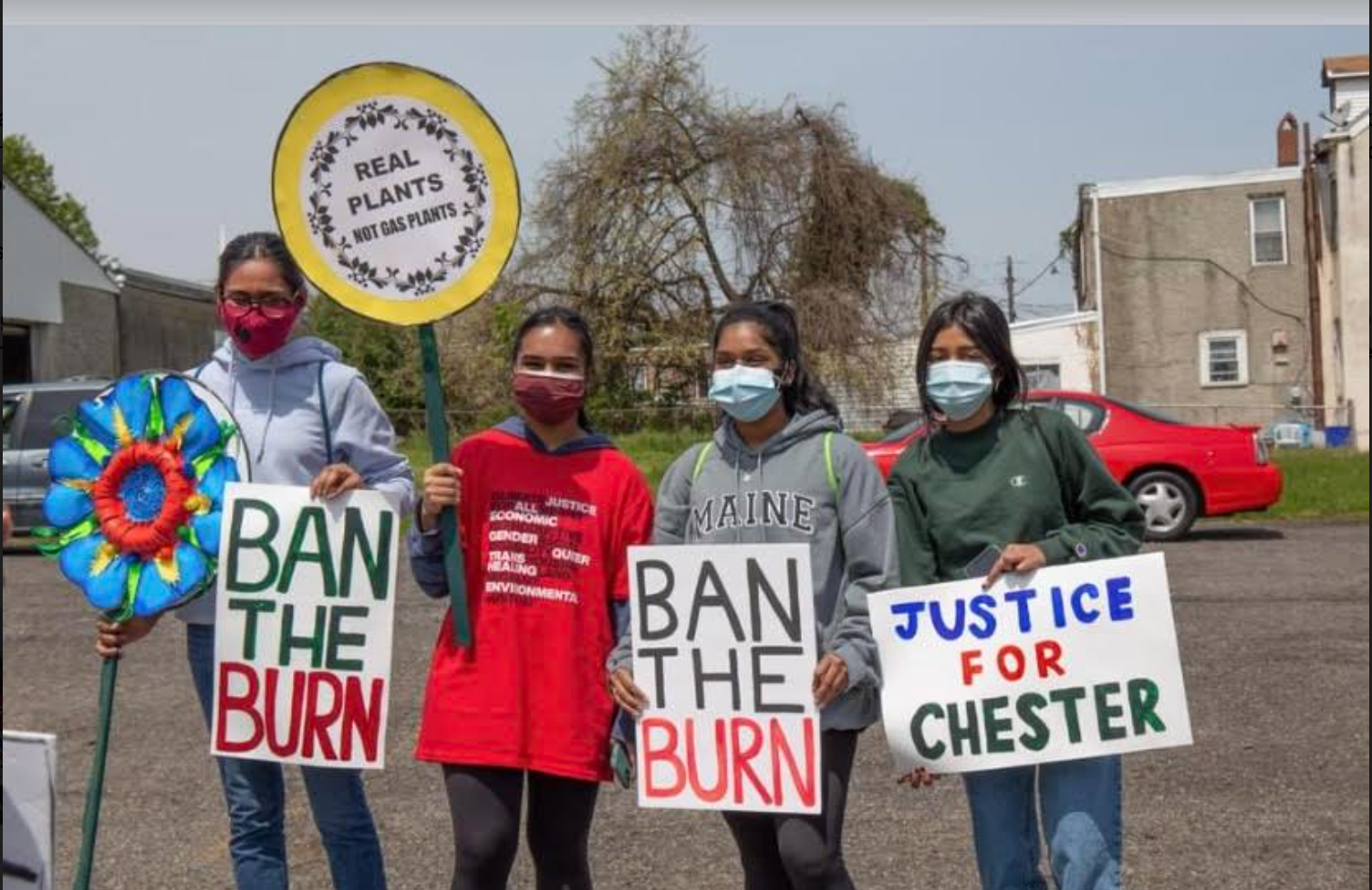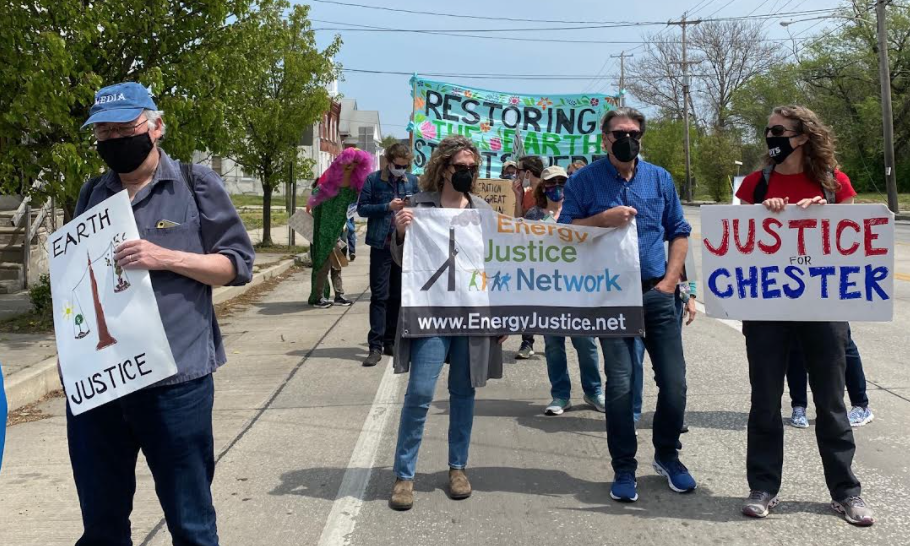ACE INTERVIEW: Pujitha Masireddy on Grassroots Organizing
|
February 24, 2022

Pujitha Masireddy is an 18-year-old advocate located in Southeastern PA. She is involved in prison abolition and climate justice organizing. In terms of environmental justice, she works closely with an organization in Chester known as Chester Residents Concerned for Quality Living (CRCQL). She is passionate about grassroots organizing and the power that collective action can have on combating the climate crisis.
Nico Lovejoy (NL): When did you first learn about the climate crisis? What was your immediate reaction?
Pujitha Masireddy (PM): I remember learning about the climate crisis briefly in middle school, but I was able to explore it deeper in my 10th grade AP Environmental Science class. My immediate reaction was being upset and frustrated that there was a lack of emphasis about how the crisis affected people, especially marginalized communities. I think many of us understand climate change’s impact on animals and wildlife, but rarely are we exposed to the detrimental impact that it can have on low-income communities of color. I was also frustrated that many climate advocacy campaigns were so fixated on individual efforts and placing blame on individuals, when the blame should be placed on corporations and an economic system that is rooted in the extraction and exploitation of both land and people.
NL: When did you first decide to get involved in climate activism? How and why did you come to that decision?
PM: I think my first example of getting involved in organized climate activism was with ACE and the fellowship program at the end of my sophomore year. I came to that decision because I wanted to get involved in environmental justice advocacy. I wanted to understand the intersection of race, gender, and class and how that plays in the climate crisis.
NL: Recently you’ve participated in grassroots organizing against the Covanta incinerator in Chester, can you give a brief summary of the issue at hand?
PM: Yes, so Chester, PA is a low-income predominantly Black community and the Covanta incinerator there is one of the largest incinerators in the entire country. It is a direct example of environmental racism as the incinerator contributes to rampant air pollution and adverse health risks. The trash being burned in Chester is not even completely the city’s own waste. Places like Ocean City Maryland have contracts with Covanta to send their trash to Chester to be burned which is obviously a major injustice. Chester residents should not bear the brunt of another town’s trash. Our campaign, “Boycott Ocean City Maryland,” was centered on pressuring OCMD’s City Council to discontinue their contract with Covanta and to start recycling instead.

NL: Why is this important to you?
PM: It’s important to me because it’s a very local issue and it’s easy to be disconnected to examples of environmental racism in other states, but this injustice is not very far from me. And my cultural values are what really launched me into advocacy. This idea of treating your community like family and being centered in community is largely emphasized in Indian culture. There is a phrase in Sanskrit known as “Vasudhaiva Kutumbakam” which means “the world is one family.” At the same time, I have seen how anti-Blackness is prevalent in the Indian community and I wanted to learn about systemic racism as a way to educate my Indian community and combat harmful rhetoric. So that is one avenue that I entered advocacy through.
…my cultural values are what really launched me into advocacy. This idea of treating your community like family…there is this phrase in Sanskrit known as ‘Vasudhaiva Kutumbakam’ which means ‘the world is one family.’
NL: How do you think grassroots organizing has helped fight for the community?
PM: Grassroots organizing in Chester has been happening since the 90s. And that is something that really fascinates me. The longevity and tenacity of the EJ movement in Chester is remarkable and everyday I am grateful to learn and absorb knowledge from individuals who have been spearheading this fight for a long time. I think it is through this continuous pressure that so many people in Chester and in surrounding cities know about the incinerator and they have joined this movement. Someone I look up to is Zulene Mayfield who is a vital voice in the organization, CRCQL (Chester Residents Concerned for Quality Living). Her perseverance inspires me and her energy and passion is so contagious.
NL: When and why did you get involved with the Action for the Climate Emergency?
PM: I got involved with ACE in August of 2020. I got started in the PA Fellowship program and since then have been on the Youth Leadership Team, Youth Advisory Board, and Action Team Lead. I got involved because I saw a social media flier about the fellowship and it seemed super interesting and I wanted to virtually connect with other environmental justice organizers and be part of that network of young activists.
NL: What kinds of actions have you been able to participate in through your work with ACE?
PM: In the fellowship, I worked on the Enough! Campaign doing voter registration work. We sent postcards and did phone, text, and email banking. As part of the Youth Leadership Team, I offered campaign input to a renewable energy campaign and ACE’s rebrand. With the Youth Advisory Board, we ensure the youth voice is centered at ACE and work with ACE staff on developing campaign strategies. Currently, we are working on the new mental health campaign and reducing climate anxiety. As an Action Team Lead, I work with my peers at Great Valley High School. We met with our Representative Chrissy Houlahan to discuss our goals and demands around declaring a climate emergency. ACE has given me numerous opportunities such as attending climate summits, connecting with other organizations, and meeting with elected officials. One very memorable experience was attending the PowerShift conference last year which was amazing as I got to hear from Angela Davis and many other revolutionaries.
NL: When was a time you felt proud of the impact you had made through your climate activism?
PM: One experience that I think about a lot is marching alongside Chester residents and allies towards the Covanta incinerator chanting “Ban the burn!” This was an impactful moment for me because I truly experienced the power in collective organizing. This rally was last year in April for Environmental Justice Day and it was really incredible to hear from organizers and their words of perseverance resonated with me greatly.

NL: How do you cope with the fear and anxiety that the climate crisis induces?
PM: Self care and taking time to do the things that bring you joy and relax you are really important, especially in spaces such as this. I think we all know that advocacy can be draining work and climate anxiety specifically is a real thing many young people have. For me, I rely on art to offer that sense of comfort. I love painting and have been getting into ceramics recently. As a constantly anxious person, I can’t say that I have mastered the method to cope with climate anxiety, but I try to spend time engaged in activities that can release such stress.
NL: What is your advice to young people who want to get involved in climate activism?
PM: I think I would tell other young people to take comfort in community and to not feel as if you need to do everyone on your own. I think creating a group of peers that you can rely on through hurdles is really important and this is one of the strengths of the action team. I think it is also important to couple grassroots organizing and praxis with education and ensure that you are continuing to read the work of revolutionaries to understand the climate crisis in a broader, historical lens. Also, it is really vital to prioritize your mental health and ensure you are taking care of yourself in order to continue this work.
NL: Why is grassroots organizing important?
PM: Grassroots organizing is important because there is no one that knows the needs of a community better besides that specific community. There is real power in mobilizing people and rallying for change and justice. Grassroots organizing is a radical, effective form of resistance that has a lasting impact. Grassroots organizing is centered on uplifting the voices that need to be heard the loudest and places community at the core of the movement.
Photos courtesy of Puji Masireddy.
Answers may have been edited for length.
Want to read more? Check out the ACE Blog!
Join our Youth Action Network
More Blog Posts
Driving India towards self sufficiency and freedom from oil
India can shield itself from oil-price shocks and global pressure over Russian barrels by leaning harder into two strengths it …
Read More
Unnatural, Not Unprecedented
For two weeks, residents of Southern California endured a waking nightmare. Parents raced against time – hurrying down the driveway …
Read MoreCrafting a Vision for the Future: My Experience at LCOY USA 2024
Dry and sunny Tempe, Arizona where temperatures have been over 100 F for 113 consecutive days, delegates gathered to attend …
Read More